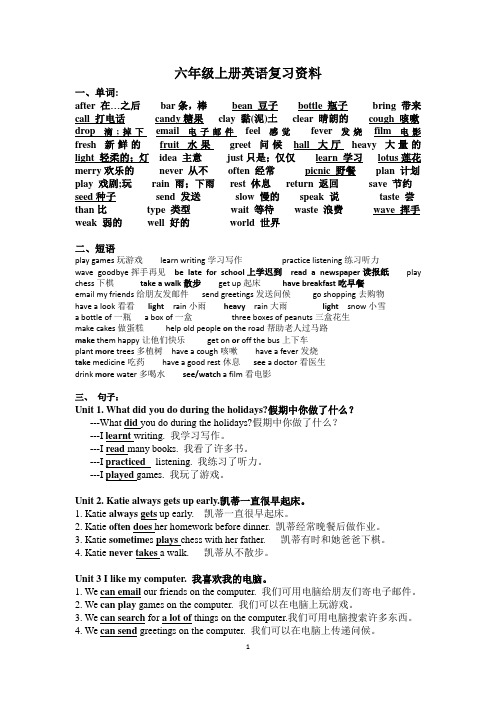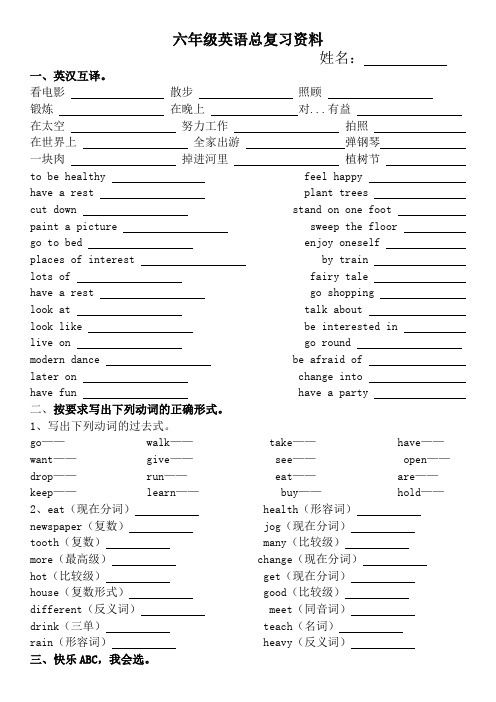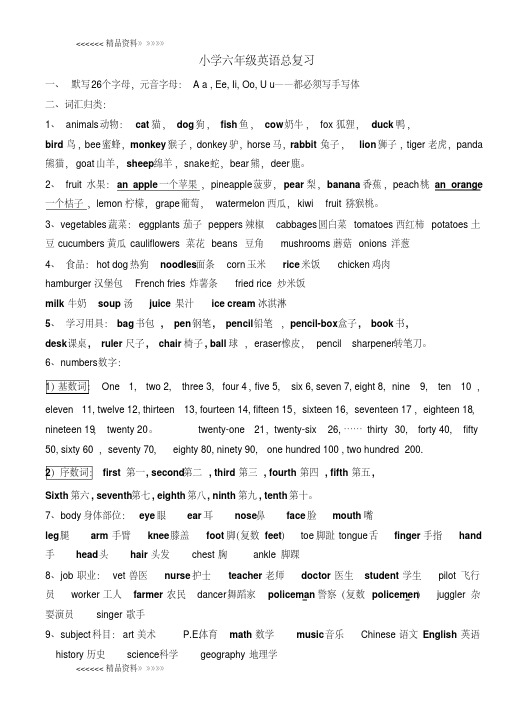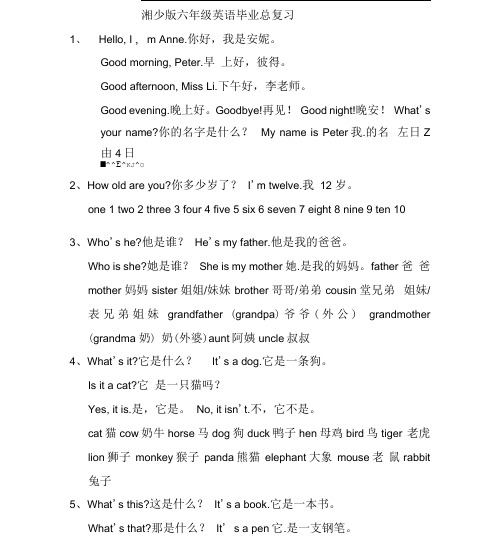新湘少版小学六年级英语期末复习资料总结
湘少版六年级上册英语期末复习

yesterday昨天 yesterday morning昨天早上 the day before yesterday前天 last night 昨晚 last week上周 last month上个月 last year去年 just now刚才 two days ago两天前 in 1990 …..
平日 起床 吃早餐 醒来 总是,一直 通常 经常 有时 从不 每天 迟的,晚的 上学迟到
家庭 挥手告别 去上学 上床睡觉 做她的家庭作业 看报纸 下棋 走路 返回 早的 伤害 科学家
family wave goodbye go to school go to bed do her homework read a newspaper play chess take a walk return early hurt scientist
Unit11 Shall we go to the theatre? 我们一起去剧院好吗?
Unit12 It’s Christmas again! 圣诞节又到了!
Unit 1 What did you do during the holidays?
单击此处添加大标题内容
5.不规则变化的动词过去式:
have--- am/is- get--- are--- say--- feel--- do/does--- go--- sit--- eat--- bring--- think---
had was got were said felt did went sat ate brought thought
翻译:
It will be sunny and cool tomorrow.
湘少版小学英语六年级复习知识点

湘少版小学英语六年级复习知识点文稿归稿存档编号:[KKUY-KKIO69-OTM243-OLUI129-G00I-FDQS58-湘少版(湖南少年儿童出版社出版)小学英语教材知识点,使用湘教版小学英语教材六年级(de)老师应该用得着,这些知识点还是很全面(de),希望对您有所帮助.1.字母:(大小)辨认、书写顺序;元音字母:A a , Ee, Ii, Oo, Uu2. 数字:1~999(de)基数词和序数词(de)运用,如计算、购物、时间、日期等.句型:①What's your number②What’s the time③How many pens are there④How old are you⑤How much is it⑥How tall are you⑦How heavy are you⑧What time do you get up⑨When's your birthday⑩What time did you see him3. 颜色:单词:red, pink, yellow, brown, blue, purple, orange, black, white, green.句型:①What colour is it②What’s your favourite colour4. 时间:年、季节、月、星期、日、时刻:Season( spring, summer, autumn, winter)Month: January, February, March, April, May, June, July, August, September, October, November, December.Week:Sunday, Monday, Tuesday, Wednesday, Thursday, Friday, Saturday.Day:1st May (the first of May), May 2nd ( May the second)句型:见话题2.5. 食品与饮料:人对食品与饮料(de)喜好;东西方食品.句型:①I like biscuits.②I’d like a cold drink.③Would you like some buns④Do you want some rice⑤This isn’t my food.6. 服装:服装(de)颜色:人对服装(de)喜好;某人(de)穿戴;所属关系;位置等.句型:①I like the green T-shirt.②Where’s my new cap③Who’s shirt is this④Is this your hat7.物品:名词(de)单、复数;特点、颜色、所属关系;存在(de)位置(in, on, under, beside, behind, in front of, above, near, inside, outside).玩具(toy car, doll, )文具(desk, book, bag ,pen, pencil, pencil-box, ruler, pencil sharpener,)句型:①What’s this②What colour is it③Whose is this④This is my brother’s painting.⑤I have a puppet.⑥There's a car near the hospital.⑦Was it in the wardrobe⑧Is there a book on the desk⑨That's not mine.8.动物和植物:cat, dog, duck, fish, sheep, bird, panda, monkey, rabbit, hen , cock, chick, tiger, lion, pig, cow , mouse (mice), elephant, ladybird, puppy, tree, flower, rose,9. 建筑与场所:factory, hospital, park, house, library, museum, office, farm, post office, bank, police station, railway station, bookstore, school, classroom, skating rink, café, house(ba throom, living-room, sitting-room, bedroom,kitchen),garden…10. 身体:head, hair, eye, nose, ear, mouth, neck, hand, finger, foot(feet) ,toe…外貌: fat, thin, tall, short, old, young, two big blue eyes, long hair, short hair, black hair. 句型:①This is my nose.②Touch your head.③Raise your arm.11. 个人情况:姓名、年龄、地址、特点与爱好.句型:①I'm twelve years old.②My hobby is reading.③I like music.④I'm interested in space.⑤My name is Peter.⑥I'm tall and thin.⑦Do you have any hobbies12. 家庭、亲属和朋友:姓名、年龄、地址、职业、特点与爱好、与你(de)关系family, grandfather(grandpa/granddad), grandmother(grandma/grand mum), father, mother, brother, sister, uncle, aunt, cousin, friend.句型:①Who's heHe's my father.②He's a doctor③He likes playing games.④My father helps me.⑤Is he a soldier⑥What’s he13. 学校:学校建筑和学校生活.school, classroom, library, playground, Chinese, maths , English, music, computer, PE, art, science,句型:①When do you go to school②What time do you have English14. 情绪和身体状态:happy, sad, tired, angry, shy, sorry, well, sick,句型:①I'm sick.②I'm happy.③We are sorry.④ I feel sad.15. 社交礼仪:礼貌用语;询问与应答.句型:问候①Hello./ Hi.②Good morning/afternoon/evening.③How are you ④How do you do⑤Glad to meet you./ Nice to meet you.介绍①My name is…②I’m a pupil.③I’m 12.④This is our teacher, Miss Chen.⑤He is from Japan.道别①Goodbye./Bye.②See you.③Good night.道谢①Thank you./Thanks.②You’re welcome.道歉①Sorry.②I’m sorry.③Excuse me.请求①Can I have a puppy ②Can I borrow a pencil ③Yes, please.④Of course.祝愿①Happy birthday.②Merry Christmas.提供帮助①Can I help you ②What can I do for you ③What’s the matter寻求帮助和建议①What can I do用餐①Do you want some soup ②Would you like some rice ③I'd like a cold drink.购物①Which one do you want ②Can I look at it ③I want a red one, please.④It's too expensive.⑤Have you got enough money⑥How much is it16.国家与国庆日:China, Japan, America (the USA), English( the UK), Australia, Russia, Canada, Singapore, India, France,句型:①When’s your country’s National Day②I come from China.17.天气与气候特征:hot, cold, cool, warm, sun, sunny, rain ,heavy rain, rainy, wind, strong wind,windy, snow , heavy snow, cloud, cloudy, …句型:①What's the weather like②It’s a cold day.③Spring is warm and nice.④Tomorrow will be rainy.⑤I like a sunny day.18. 节日:节日(de)特点;节日(de)活动.New Year's Day, Spring Festival, Children's Day, Mid-autumn Festival, Teachers' Day , National Day, Christmas Day, Dragon Boat Festival.19. 正在发生(de)事情:现在进行(de)动作和发生(de)事.句型:①Are you making a kite②Peter is writing.③What's Anne doing④Where are you going⑤What are they doing⑥Is he running20.日常生活:日常生活、工作、学习(de)活动.句型:①I come to school by bus.②Your homework is good.③What time do you get up④She always get up early.21. 计划与打算:计划和将要进行(de)动作be going to do …句型:①I’m/You’re /He’s/She’s /We’re/They’re (not) going to swim.②Are you going to swim③Is he/she going to visit Anne④What are you going to do⑤What is he going to do⑥When are they going to swim⑦Tomorrow will be rainy.⑧ I'll stay at home.22. 能力和可能:能做某事或可能进行某事.句型:①Can you read and write in English②Can I have a puppy③What can you do④She can run fast.23. 过去发生(de)事情或过去(de)打算:过去式.句型:①Where were you②Who was first③Was it in the wardrobe④Benny took my ball.⑤Where did you go⑥What did you do⑦I came by plane.⑧Anne wanted to skate.24. 对事物(de)比较:比较级和最高级.句型:①My singing is louder than yours.②I’m taller than you.③There more shops in Picture One.④Some stories are more interesting than others.⑤The most interesting stories.⑥Who is fatter25.提醒与告示:①What does that sign mean②Draw a cat on the roof.③Don't put your feet on the seat.④No speaking.⑤Do not go in.26.擅长和喜欢(de)事情:①I'm/ You're/ He's good at drawing.②I like playing basketball.。
自用新湘少版六年级英语上下册复习资料

六年级上册英语复习资料一、单词:after 在…之后bar条,棒bean 豆子bottle 瓶子bring 带来call 打电话candy糖果clay 黏(泥)土clear 晴朗的cough 咳嗽drop 滴;掉下email 电子邮件feel 感觉fever 发烧film 电影fresh 新鲜的fruit 水果greet 问候hall 大厅heavy 大量的light 轻柔的;灯idea 主意just只是;仅仅learn 学习lotus莲花merry欢乐的never 从不often 经常picnic 野餐plan 计划play 戏剧;玩rain 雨;下雨rest 休息return 返回save 节约seed种子send 发送slow 慢的speak 说taste 尝than比type 类型wait 等待waste 浪费wave 挥手weak 弱的well 好的world 世界二、短语play games玩游戏learn writing学习写作practice listening练习听力wave goodbye挥手再见be late for school上学迟到read a newspaper读报纸play chess下棋take a walk散步get up起床have breakfast吃早餐email my friends给朋友发邮件send greetings发送问候go shopping去购物have a look看看light rain小雨heavy rain大雨light snow小雪a bottle of一瓶 a box of一盒three boxes of peanuts三盒花生make cakes做蛋糕help old people on the road帮助老人过马路make them happy让他们快乐get on or off the bus上下车plant more trees多植树have a cough咳嗽have a fever发烧take medicine吃药have a good rest休息see a doctor看医生drink more water多喝水see/watch a film看电影三、句子:Unit 1. What did you do during the holidays?假期中你做了什么?---What did you do during the holidays?假期中你做了什么?---I learnt writing. 我学习写作。
湘少版六年级英语总复习资料

六年级英语总复习资料姓名:一、英汉互译。
看电影散步照顾锻炼在晚上对...有益在太空努力工作拍照在世界上全家出游弹钢琴一块肉掉进河里植树节to be healthy feel happy have a rest plant trees cut down stand on one foot paint a picture sweep the floor go to bed enjoy oneself places of interest by train lots of fairy tale have a rest go shopping look at talk about look like be interested in live on go round modern dance be afraid of later on change into have fun have a party二、按要求写出下列动词的正确形式。
1、写出下列动词的过去式。
go—— walk—— take—— have——want—— give—— see—— open——drop—— run—— eat—— are——keep—— learn—— buy—— hold——2、eat(现在分词) health(形容词)newspaper(复数) jog(现在分词)tooth(复数) many(比较级)more(最高级) change(现在分词)hot(比较级) get(现在分词)house(复数形式) good(比较级)different(反义词) meet(同音词)drink(三单) teach(名词)rain(形容词) heavy(反义词)三、快乐ABC,我会选。
1、——Where are we today ——We will go to the library. go2、Dongdong often rides bicycle to school.B. theC. /3、Mr li likes his family to the beach.taking take4、What your family usually do5、We will have good time together.B. anC./6、The cat took the fish and walked home .7、It saw dog in the river.other8、A little dog dropped the river.9、There are many magic stories in .story book tale10、Wash our hands before is right.11、Please keep the window .The air is fresh.12、He always to bed before 10:00 .13、Drinking milk is good us.14、——Shall we go to the park ——!you ’s OK like drawing15、—— she draw ——Yes,she can.16、I write than Lily.17、They have lots of .18、 more water is good for us.19、Trees can keep the air .20、I like ice cream chocolate.21、The river is more dirty.22、In recent years, people have mobile phone.and many and more and much23、They watched a film the earth.24、She was very interested music.25、He looked for books space.26、He to the park last Sunday.27、He wants a new pencil.buy28、—— did you want to do ——I wanted to paint a picture.29、Anne can play piano very well.C./30、We need more time a rest.have31、He borrowed some books to find more about the earth.32、Peter is afraid dropping into the river.33、I don’t know what happened on.34、To be healthy, Peter 800 meters every day.35、Tomorrow sunny.be36、Mother lets me my homework.do37、Children are very happy International Children’s Day.38、They are the beautiful dress.about of about39、My mother took me to Shanghai train.40、This telephone is old but it is still .41、This is pear and that is apple.;an ;a a42、Can you me,please。
湘少版小学六年级英语总复习(精华版)学习资料

小学六年级英语总复习一、默写26个字母,元音字母: A a , Ee, Ii, Oo, U u——都必须写手写体二、词汇归类:1、animals动物:cat猫,dog狗,fish鱼,cow奶牛,fox狐狸,duck鸭,bird鸟,bee蜜蜂,monkey猴子,donkey驴,horse马,rabbit兔子,lion狮子,tiger老虎,panda 熊猫,goat山羊,sheep绵羊,snake蛇,bear熊,deer鹿。
2、fruit水果:an apple一个苹果,pineapple菠萝,pear梨,banana香蕉,peach桃an orange 一个桔子,lemon柠檬,grape葡萄,watermelon西瓜,kiwi fruit猕猴桃。
3、vegetables蔬菜:eggplants 茄子peppers 辣椒cabbages 圆白菜tomatoes 西红柿potatoes 土豆cucumbers 黄瓜cauliflowers 菜花beans 豆角mushrooms 蘑菇onions 洋葱4、食品:hot dog热狗noodles面条corn玉米rice米饭chicken鸡肉hamburger 汉堡包French fries 炸薯条fried rice 炒米饭milk牛奶soup 汤juice 果汁ice cream 冰淇淋5、学习用具:bag书包, pen钢笔, pencil铅笔,pencil-box盒子, book书,desk课桌, ruler尺子, chair椅子, ball球,eraser橡皮,pencil sharpener转笔刀。
6、numbers数字:1)基数词:One 1, two 2, three 3, four 4,five 5, six 6, seven 7, eight 8, nine 9, ten 10 ,eleven 11, twelve 12, thirteen 13, fourteen 14, fifteen 15,sixteen 16,seventeen 17 ,eighteen 18,nineteen 19,twenty 20。
完整版湘少版六年级英语毕业总复习

湘少版六年级英语毕业总复习1、Hello, I , m Anne.你好,我是安妮。
Good morning, Peter.早上好,彼得。
Good afternoon, Miss Li.下午好,李老师。
Good evening.晚上好。
Goodbye!再见!Good night!晚安!What's your name?你的名字是什么?My name is Peter我.的名左日Z 由4日■^^E^KJ^O2、How old are you?你多少岁了?I'm twelve.我12 岁。
one 1 two 2 three 3 four 4 five 5 six 6 seven 7 eight 8 nine 9 ten 103、Who's he?他是谁?He's my father.他是我的爸爸。
Who is she?她是谁?She is my mother 她.是我的妈妈。
father 爸爸mother妈妈sister姐姐/妹妹brother哥哥/弟弟cousin堂兄弟姐妹/表兄弟姐妹grandfather (grandpa)爷爷(外公) grandmother (grandma 奶) 奶(外婆)aunt阿姨uncle叔叔4、What's it?它是什么?It's a dog.它是一条狗。
Is it a cat?它是一只猫吗?Yes, it is.是,它是。
No, it isn't.不,它不是。
cat猫cow奶牛horse马dog狗duck鸭子hen母鸡bird鸟tiger 老虎lion 狮子monkey 猴子panda 熊猫elephant 大象mouse 老鼠rabbit 兔子5、What's this?这是什么?It's a book.它是一本书。
What's that?那是什么?It' s a pen它.是一支钢笔。
完整)湘少版小学六年级英语总复习(精华版)
完整)湘少版小学六年级英语总复习(精华版)XXX grade English。
we will cover several areas of XXX。
Firstly。
it is important to be able to write all 26 letters ofXXX to include the five vowels: A a。
E e。
I i。
O o。
and U u。
Next。
XXX animals。
we have cat。
dog。
fish。
cow。
fox。
duck。
bird。
bee。
monkey。
donkey。
horse。
rabbit。
n。
tiger。
panda。
goat。
sheep。
snake。
bear。
and deer。
In the fruit category。
we have apple。
pineapple。
pear。
banana。
peach。
orange。
lemon。
grape。
watermelon。
and kiwifruit。
Some common vegetables include eggplants。
peppers。
cabbages。
tomatoes。
potatoes。
cucumbers。
cauliflowers。
beans。
mushrooms。
and ns。
For food。
we have hot dogs。
noodles。
corn。
rice。
chicken。
hamburgers。
French fries。
fried rice。
milk。
soup。
juice。
and ice cream。
Finally。
some common school supplies include a bag。
pen。
pencil。
pencil-box。
book。
desk。
ruler。
chair。
ball。
eraser。
and pencil sharpener。
Lastly。
XXX recognize and write numbers。
湘少版六年级英语总复习
湘少版六年级英语总复习文档编制序号:[KK8UY-LL9IO69-TTO6M3-MTOL89-FTT688]六年级英语总复习资料姓名:一、英汉互译。
看电影散步照顾锻炼在晚上对...有益在太空努力工作拍照在世界上全家出游弹钢琴一块肉掉进河里植树节to be healthy feel happy have a rest plant treescut down stand on one foot paint a picture sweep the floorgo to bed enjoy oneself places of interest by trainlots of fairy tale have a rest go shoppinglook at talk aboutlook like be interested in live on go round modern dance be afraid of later on change intohave fun have a party二、按要求写出下列动词的正确形式。
1、写出下列动词的过去式。
go—— walk—— take—— have——want—— give—— see—— open——drop—— run—— eat—— are——keep—— learn—— buy—— hold——2、eat(现在分词) health(形容词)newspaper(复数) jog(现在分词)tooth(复数) many(比较级)more(最高级) change(现在分词)hot(比较级) get(现在分词)house(复数形式) good(比较级)different(反义词) meet(同音词)drink(三单) teach(名词)rain(形容词) heavy(反义词)三、快乐ABC,我会选。
1、——Where are we today ——We will go to the library. go2、Dongdong often rides bicycle to school.B. theC. /3、Mr li likes his family to the beach.taking take4、What your family usually do5、We will have good time together.B. anC./6、The cat took the fish and walked home .7、It saw dog in the river.other8、A little dog dropped the river.9、There are many magic stories in .story book tale10、Wash our hands before is right.11、Please keep the window .The air is fresh.12、He always to bed before 10:00 .13、Drinking milk is good us.14、——Shall we go to the park ——!you ’s OK like drawing15、—— she draw ——Yes,she can.16、I write than Lily.17、They have lots of .18、 more water is good for us.19、Trees can keep the air .20、I like ice cream chocolate.21、The river is more dirty.22、In recent years, people have mobile phone.and many and more and much23、They watched a film the earth.24、She was very interested music.25、He looked for books space.26、He to the park last Sunday.27、He wants a new pencil.buy28、—— did you want to do ——I wanted to paint a picture.29、Anne can play piano very well.C./30、We need more time a rest.have31、He borrowed some books to find more about the earth.32、Peter is afraid dropping into the river.33、I don’t know what happened on.34、To be healthy, Peter 800 meters every day.35、Tomorrow sunny.be36、Mother lets me my homework.do37、Children are very happy International Children’s Day.38、They are the beautiful dress.about of about39、My mother took me to Shanghai train.40、This telephone is old but it is still .41、This is pear and that is apple.;an ;a a42、Can you me,please。
新湘少版小学六年级英语期末复习资料总结
新湘少版六年级上册英语资料Unit 1 What did you do during the holidays?假期你做什么了?★单词、短语during 在…期间holiday 假期learn words and sentences学习单词和句子 play games玩嬉戏learn writing学习写作 practice listening练习听力★句子时态1. What did you do during the holidays? 假期间你做了什么?--I read many books./ I learnt writing. / I wrote a little storybook in English./ I visited my grandpar ents.2、时态:一般过去时,表示过去某个时间里发生的动作或存在的状态。
主要有动词的过去式来表达,其标记词是过去的时间。
如:yesterday昨天 last night昨晚 last week上周 last year 去年等等。
动词过去式改变规律:1. 一般状况下,干脆在动词词尾加ed. 如:talk—talked说 listen—listened听play—played 玩 climb—climbed爬2. 以不发音的e结尾,在动词词尾加d. 如:practise—practised练习3. 以辅音字母加y结尾的动词,变y为i再加ed. 如:study—studied学习,探讨4. 以一个辅音字母结尾的重读闭音节词,双写最终一个辅音字母,再加ed.如:stop—stopped停顿5.不规则动词没有规律,须要特别记。
如:do-did have—had go—went learn—learnt take —took read—read speak—spoke teach—taught stand—stood sit—sat say—said run—ran is, am—was are—were write--wroteUnit 2 Katie always gets up early凯蒂总是很早起床★单词、短语weekday工作日after在…之后before在..之前 always总是,常常 often时常sometimes有时 never从不wave goodbye挥手再见be late for school上学迟到 read a newspaper读报纸play chess下棋 take a walk漫步get up起床return home回家 have breakfast/lunch/dinner吃早/ 中/ 晚餐★句子时态:1. Katie always gets up early.2.She often does her homework before dinner.3、. She sometimes plays chess with her father after dinner. 4.She never takes a walk.4.一般如今时:表示常常,反复发生的动作或存在的状态.与.always/often/sometimes/never/everday等时间状语连用。
湘少版六年级下册英语总复习学习资料
六年级下册英语总复习一:学生易错词汇1. a, an的选择: 元音字母开头的单词用an,辅音字母开头的单词用a.2. am , is , are的选择: 单数用is , 复数用are. I 用 am , you 用 are.3. have , has 的选择: 表示某人有某物。
单数用has , 复数用have. I , you 用have .4. there is, there are 的选择:表示某地有某物,某人。
单数用there is , 复数用there are.5. some, any 的选择:肯定句用some, 疑问句和否定句用any.6. 疑问词的选择:what (什么) who (谁) where (哪里) whose (谁的) why(为什么)when(什么时候)which(哪一个)how old (多大) how many (多少)how much(多少钱)二:形容词比较级详解当我们需要对事物作出比较时,需要用到比较级。
比较级的句子结构通常是:什么 + 动词be (am , is , are ) + 形容词比较级 + than(比)+ 什么 ,如:I’m taller and heavier than you. (我比你更高和更重。
)An elephant is bigger than a tiger. (一只大象比一只老虎更大。
)形容词的比较级是在形容词的基础上变化而来的,它的变化规则是:①一般的直接在词尾加er ,如 tall - taller , strong - stronger ,②以e结尾的,直接加r ,如 fine – finer ,③以辅音字母加y结尾的,先改y为i再加er,如funny - funnier④双写最后的字母再加er,如big – bigger, thin – thinner ,hot – hotter☆注意比较的两者应该是互相对应的可比较的东西。
- 1、下载文档前请自行甄别文档内容的完整性,平台不提供额外的编辑、内容补充、找答案等附加服务。
- 2、"仅部分预览"的文档,不可在线预览部分如存在完整性等问题,可反馈申请退款(可完整预览的文档不适用该条件!)。
- 3、如文档侵犯您的权益,请联系客服反馈,我们会尽快为您处理(人工客服工作时间:9:00-18:30)。
新湘少版六年级上册英语资料Unit 1 What did you do during the holidays?假期你做什么了?★单词、短语during 在…期间holiday 假期learn words and sentences学习单词和句子 play games玩游戏learn writing学习写作 practice listening练习听力★句子时态1. What did you do during the holidays? 假期间你做了什么?--I read many books./ I learnt writing. / I wrote a little storybook in English./ I visited my grandpar ents.2、时态:一般过去时,表示过去某个时间里发生的动作或存在的状态。
主要有动词的过去式来体现,其标志词是过去的时间。
如:yesterday昨天 last night昨晚 last week上周 last year 去年等等。
动词过去式变化规律:1. 一般情况下,直接在动词词尾加ed. 如:talk—talked说 listen—listened听play—played 玩 climb—climbed爬2. 以不发音的e结尾,在动词词尾加d. 如:practise—practised练习3. 以辅音字母加y结尾的动词,变y为i再加ed. 如:study—studied学习,研究4. 以一个辅音字母结尾的重读闭音节词,双写最后一个辅音字母,再加ed.如:stop—stopped停止5.不规则动词没有规律,需要特殊记。
如:do-did have—had go—went learn—learnt take —took read—read speak—spoke teach—taught stand—stood sit—sat say—said run—ran is, am—was are—were write--wroteUnit 2 Katie always gets up early凯蒂总是很早起床★单词、短语weekday工作日after在…之后before在..之前 always总是,经常 often时常sometimes有时 never从不wave goodbye挥手再见be late for school上学迟到 read a newspaper读报纸play chess下棋 take a walk散步get up起床return home回家 have breakfast/lunch/dinner吃早/ 中/ 晚餐★句子时态:1. Katie always gets up early.2.She often does her homework before dinner.3、. She sometimes plays chess with her father after dinner. 4.She never takes a walk.4.一般现在时:表示经常,反复发生的动作或存在的状态.与.always/often/sometimes/never/everday等时间状语连用。
一般人称做主语,谓语动词用原型。
当主语是第三人称单数时,谓语动词要加s或es. 第三人称单数主语包括(He,she,it 以及单个名称)一般现在时中,动词第三人称单数的用法变化规则:①一般情况直接在动词词尾加-s。
如:get—gets take—takes②以s、x、sh、ch、x、o结尾的动词,在词尾加-es。
如:teach—teaches go—goes③以辅音字母+y结尾的动词,变y为i,再加es。
如:study—studies try—tries④不规则变化 have—has★单词、短语world国家email my friends给朋友发邮件 send greetings发送问候 search for a lot of things查找许多东西 find out about countries查找国家★句子1. I like my computer.我喜欢我的电脑。
It is very fast.它很快。
2.What can we do on the computer?我们能在电脑上做什么?---We can email each other.我们可以互相发送问候。
----We can search for a lot of things.我们可以查找许多东西。
---We can send greetings to our friends.我们可以发送问候给朋友。
Unit 4 The Mid-Autumn Festival is coming中秋节到了★单词、短语the Mid-Autumn Festival中秋节nearby附近的type类型taste尝n uts坚果go shopping去购物shopping centre购物中心have a look看看louts seed莲子 red bean红豆★句子1. Which type do you like? 你喜欢哪种类型?--I like the ones with lotus seeds.我喜欢莲子馅的。
2.How much is a box of mooncakes? 一盒月饼多少钱?--It is 50yuan. 50元。
3. This mooncake tastes good.这个月饼尝起来很好吃。
4. I enjoy eating mooncakes.我喜欢吃月饼。
5. I enjoy looking at the moon.我喜欢赏月。
enjoy+doing喜欢做某事。
6.描述自己想要某物的句型:I’d like+某物如:I’d like a box of mooncakesUnit 5It will be sunny and cool tomorrow明天的天气是晴朗而又凉爽★单词、短语clear 晴朗的weather forecast天气预报 light rain小雨heavy rain大雨sunny and warm 晴朗而又暖和 strong wind强风 sunny and cool晴朗而又凉爽 light snow小雪★句子时态:1.There will be a light snow next Friday.2. It’s time for the weather forecast.3.描述未来天气的句型:①It will be+天气形容词(sunny、rainy)+其他如:It will be sunny tomorrow.②It will +天气类动词(rain、snow)+其他如:It will snow tomorrow.4.一般将来时,表示将来某个时间将要发生的动作或存在的状态。
其标志词是将来的时间。
如:tomorrow明天 the day after tomorrow后天 next week下周 next month下个月 next year明年一般将来时的句式:肯定句:主语+will+动词原形+其他 It will be clear in Shanghai.上海将是晴朗的。
否定句:主语+will not(won’t)+动词原形+其他 It won’t rain tomorrow.明天将不会下雨。
★词汇:have a picnic 野餐wait for 等候 take out 拿出have lunch 吃午饭have a picnic 野炊 a bottle of orange juice一瓶橙汁 a box of cakes 一盒蛋糕 a few cans of Coke 几罐可乐 a few bars of chocolate 几条巧克力bring带来 meet 遇见peanut 花生 fruit 水果candy糖果★学习用单位词表示名词的数量:a….of. 如:a bottle of一瓶 a box of一盒 a few cans of几罐 a few bars of几条a piece of 一张 a bowl of一碗 a cup of一杯1.如果后接可数名词,要用可数名词的复数形式。
如:a box of cakes.一盒蛋糕 a box of candies一盒糖果2.如果后接不可数名词,就用原形。
如:a bottle of orange juice一瓶橙汁。
3.如果物品数量超过一,无论后接可数名词还是不可数名词,单位词都应该用复数形式。
如:tow cans of Coke 两罐可乐Three boxes of peanuts 三盒花生 a few bars of chocolate 几条巧克力★句子1. What are we going to bring for the picnic?我们打算带什么去野餐呢? ---I will bring a few bars of chocolate.我将带几条巧克力。
I will bring a big bottle of orange juice.我将带一大瓶橙汁。
2. I can’t wait for tomorrow to come.我等不到明天的到来。
3. Let’s meet at the park at 9:00 a.m.让我们上午九点在公园见。
Unit7 What can I do?我能做什么?★单词、短语an old man一个老头an old woman一个老奶奶 the old people老人weak 虚弱的slow 缓慢的make tea泡茶make cakes做蛋糕help old people on the road帮助老人过马路 c lean their homes打扫他们的房间make them happy让他们快乐help them to get on or off the bus帮助他们上下车 help them to carry things帮助他们拿东西★句子1.What can I/you/he/she do?我/ 你/ 他/ 她能做什么?2.I/He /She can make them happy.我 /他 /她能使他们快乐。
(情态动词can的后面的动词用原形)3. I can make tea or coffee for them.我能给他们泡茶或咖啡。
4.I can help them on the road. They are weak and slow.我能帮助他们过马路。
